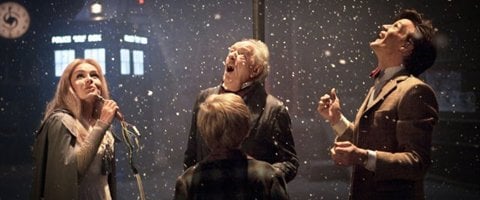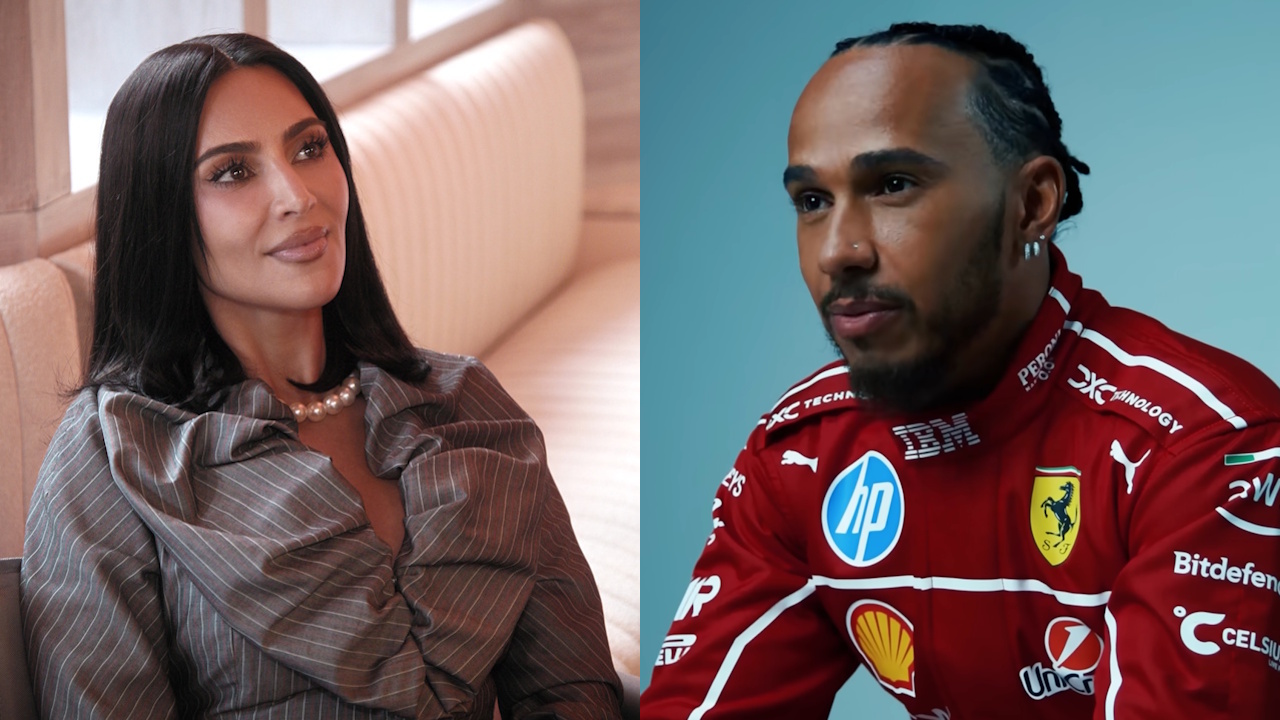For 2010's iteration on Doctor Who's semi-annual Christmas special, current series head honcho Steven Moffat gives us a Who-vian spin on Charles Dickens' "A Christmas Carol." It seems inevitable in retrospect, since the good Doctor teamed up with Dickens himself a few seasons ago, and the tone of the classic Christmas story is a perfect fit for the show's whimsical spirit and the Doctor's unique approach to problem-solving. It's funny, it's charming, it's odd, it's touching, it's phantasmagorical. It is, quite simply, Doctor Who. A Christmas Carol opens high above a world shrouded in clouds and storms. An enormous space liner cuts through the atmosphere, buffeted by turbulence. The ship must land, and soon, or the vessel will be destroyed. Amidst the chaos, the harried bridge crew soon greets an odd pair of guests: The Doctor's latest companions, Amy Pond (Karen Gillan) and Rory Williams (Arthur Darvill), who had been enjoying their honeymoon on board up until they crisis. Thankfully, they've put in a call to the one man you always want on speed dial in a crisis, and soon enough the unmistakable silhouette of the TARDIS appears on the viewscreen. However, this time The Doctor may have been his match.
On this planet, the weather is controlled by a cranky plutocrat by name of Kazran Sardick (the admirably grumpy Michael Gambon). When The Doctor (Matt Smith) appeals to him to allow the imperiled ship to land, Kazran scoffs. The planet's already overcrowded, he explains, so the last thing he's going to do is allow another ship load of peasants to land on his planet. Even worse, the weather-control device is specifically coded to his DNA, so The Doctor can't simply take control of it himself. In order to save the day, he must literally change Kazran's notoriously intractable mind. And so The Doctor begins putting Kazran through his own version of "A Christmas Carol," playing ghosts of past, present, and future as he leapfrogs through Kazran's shifting timeline in hopes of repairing the man's atrophied humanity.
The idea of crafting a new spin on Dickens' tale inside the Doctor Who universe is rather a brilliant one, and Moffat and company wring every bit of joy, lunacy, and fun out of the concept that you would expect. The Doctor's roundabout way of solving problems and reluctance to turn to violence is one of his greatest strengths, and the concept of granting someone a second chance by forcing them to reexamine their life fits perfectly into both this universe and The Doctor's established character...only here, we get time travel rather than supernatural specters, flying sharks rather than rattling chains. (Yes, I said flying sharks.) Time travel is always a tricky notion to pull off properly, but in the spirit of the sort of story being told, Moffat concerns himself less with logic and more with emotion. If you want to put every aspect of A Christmas Carol under the microscope, there's a good chance it will fray apart, but then you'll have missed the point. Doctor Who has always been as much fable and fairy tale as science fiction or space opera, and this Christmas special embraces that to wonderful effect. At its core and at its best, Doctor Who is a love letter to humanity, as viewed through the eyes of an outsider who sees all the potential and nobility buried beneath the flawed, messy complexity that is human nature. In a genre that often solves problems via blaster fire, it's always refreshing to watch The Doctor find a different way, and the underlying message that we, as a people, are capable of being better is a much-needed one these days.
Also on display is the show's boundless imagination, the pure joy of imagining a universe vaster and more full of marvels than we could fathom. It may not actually be like this "out there," but wouldn't it be nice if it were? Under first Russell T Davies and now Steven Moffat, the recent incarnations of Doctor Who have embraced an aspect of science fiction all too often neglected on both the big and small screens -- the "sense of wonder" -- with a gusto not seen since the demise of Farscape. There are no aliens with funny foreheads here. Instead we get a colony world that is both futuristic and Victorian at once. A world where the fog rolling through the streets brings with it schools of incandescent fish swimming through the mists. A world where a beast of the sky can be tamed by one song of perfect beauty from the lips of a woman who lives out her life on a succession of Christmas Eves. And a world where one lonely old man can be given a second chance, courtesy of an ageless god with a penchant for bow ties (because they're cool).
Matt Smith is at his usual, Doctoral best, equal parts whimsy, compassion, and veiled power. He may never topple David Tennant from the hearts of those who fell in love with his portrayal of the character, but Smith has proved himself an able successor, and is easily the second best of the three actors who have played the role since the relaunch of the franchise. Kazran could find no more perfect casting than in Michael Gambon, who is equally adept at moments both crotchety and fragile. And then there is Welsh singer Katherine Jenkins as Abigail, a stranger who becomes much more to Kazran, and whose haunting voice both anchors the climactic scene of the episode and introduces an original Christmas song that you will be unable to shake free of your head for several days at least.
It may be March, but it's never too late for a little Christmas spirit. And if that spirit happens to resemble a centuries-old Time Lord with floppy hair and a sonic screwdriver, so much the better. The Doctor Who sets have been consistently excellent when it comes to providing bonus features over the years, and while this one-off isn't as packed as some, it still provides plenty to occupy fans.
First up is a new episode of Doctor Who Confidential focusing on the production of A Christmas Carol. For those unfamiliar, Confidential is a BBC documentary series paired with the show itself since its relaunch a few years back. Like earlier episodes, this installment includes interviews with the cast and crew, examinations of how the episode was conceived and written, and behind-the-scenes footage of the actual shoot. You get commentary on everything from the pseudo-Victorian look of the colony world, to the special effects involving a certain sleigh ride, to the writing and recording of Abigail's song. At just under an hour, it's a satisfying meal without overstaying its welcome.
Your Daily Blend of Entertainment News
Also included is "Doctor Who at the Proms 2010," a concert featuring music from the show performed by a full orchestra, complete with guest appearances from the show's actors and frequent invasions of the audience by series baddies ranging from Cybermen to vampires. As a stateside fan, it's easy to forget just how huge a phenomenon Doctor Who is in the U.K., and this packed concert brings that home. It's also very cool to see what a multi-generational thing it is, as the crowd is mostly made up of parents and their wide-eyed kids. Watching a little girl peek through her eyes as a rubber-suited alien marches past, or seeing an in-character Matt Smith enlist a young lad from the audience to help defuse an "alien bomb" is marvelous fun, and makes me eager for the day my boys are old enough to be introduced to The Doctor. Even better: it's all accompanied by the show's excellent score.

